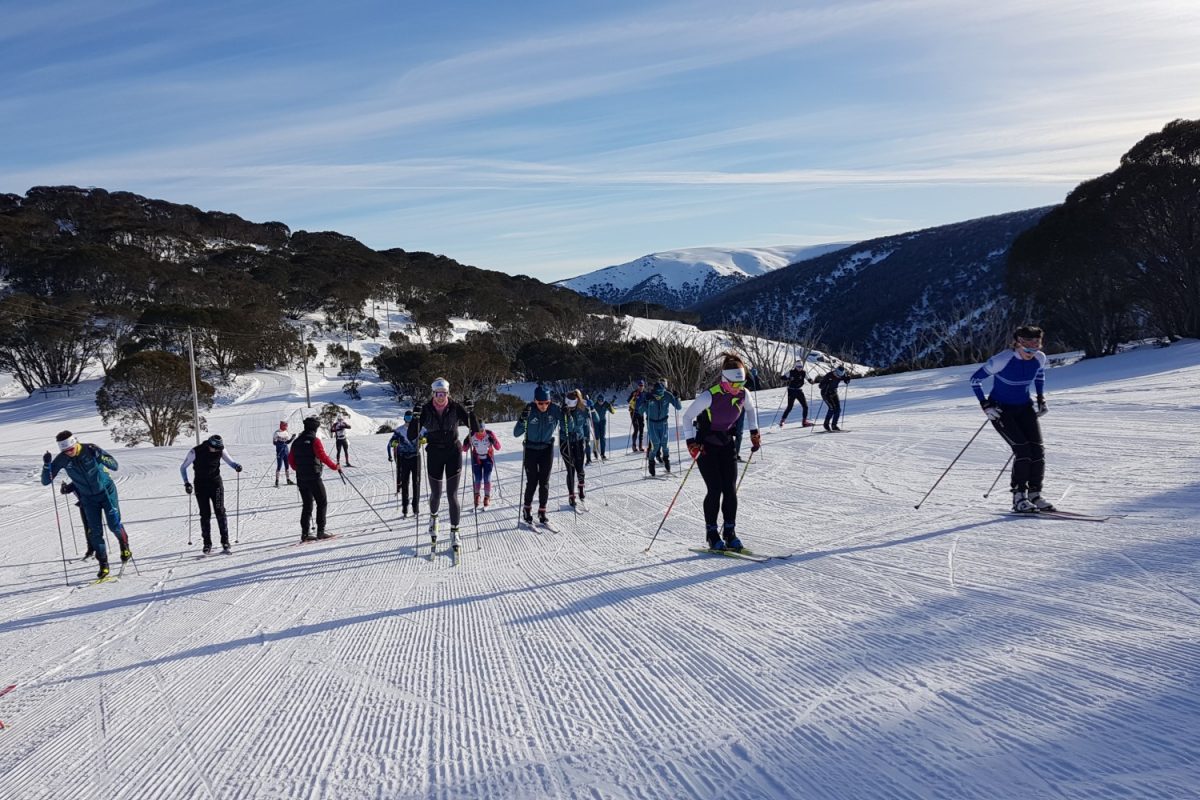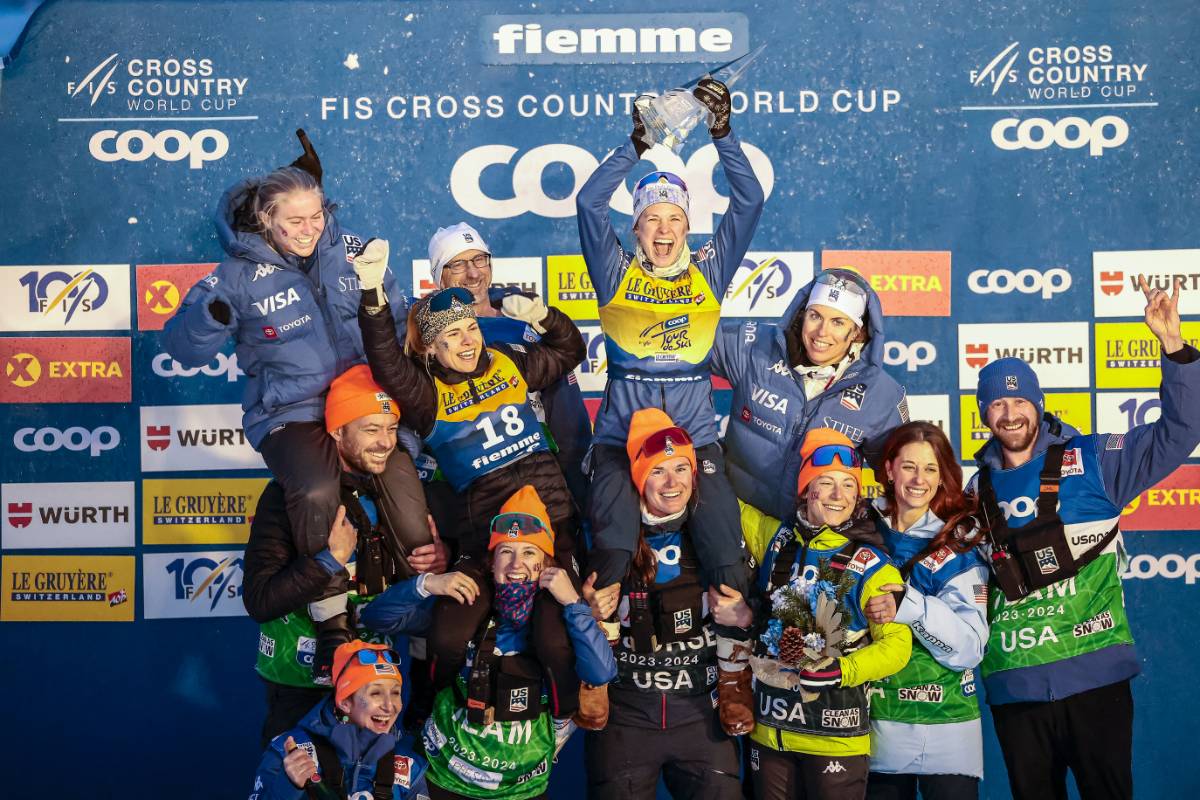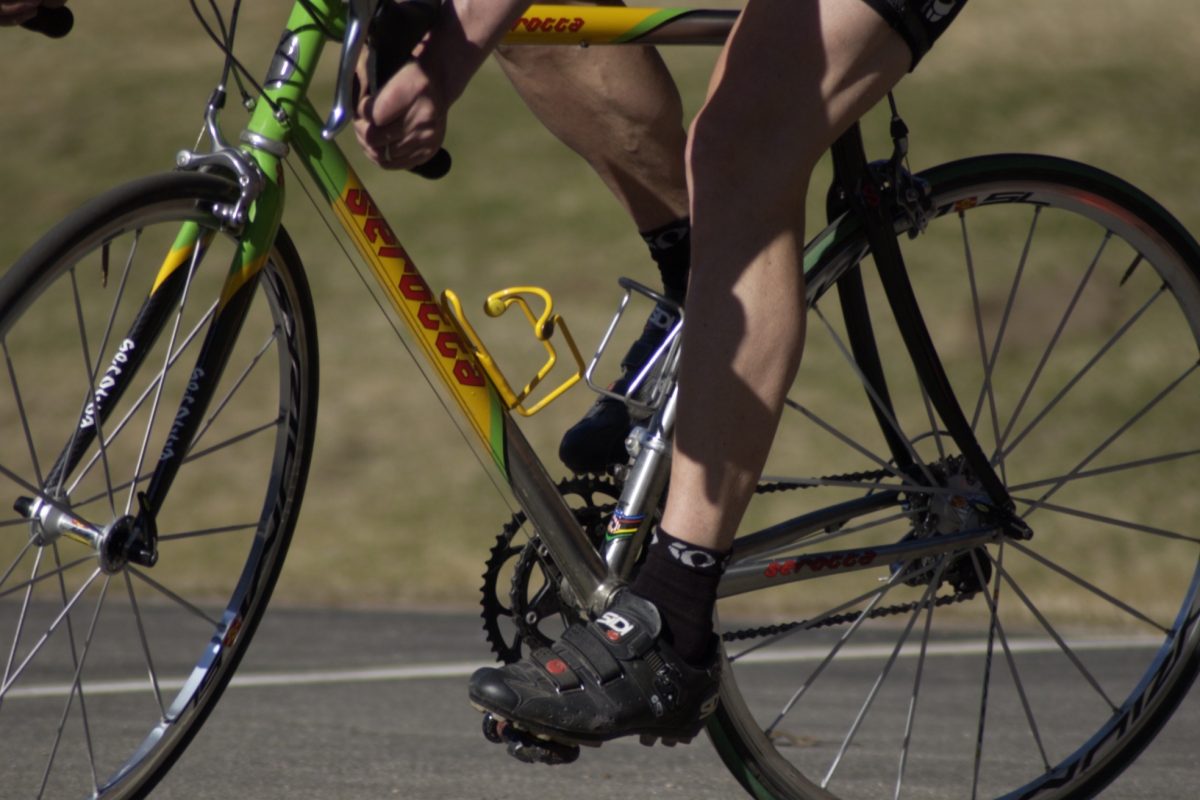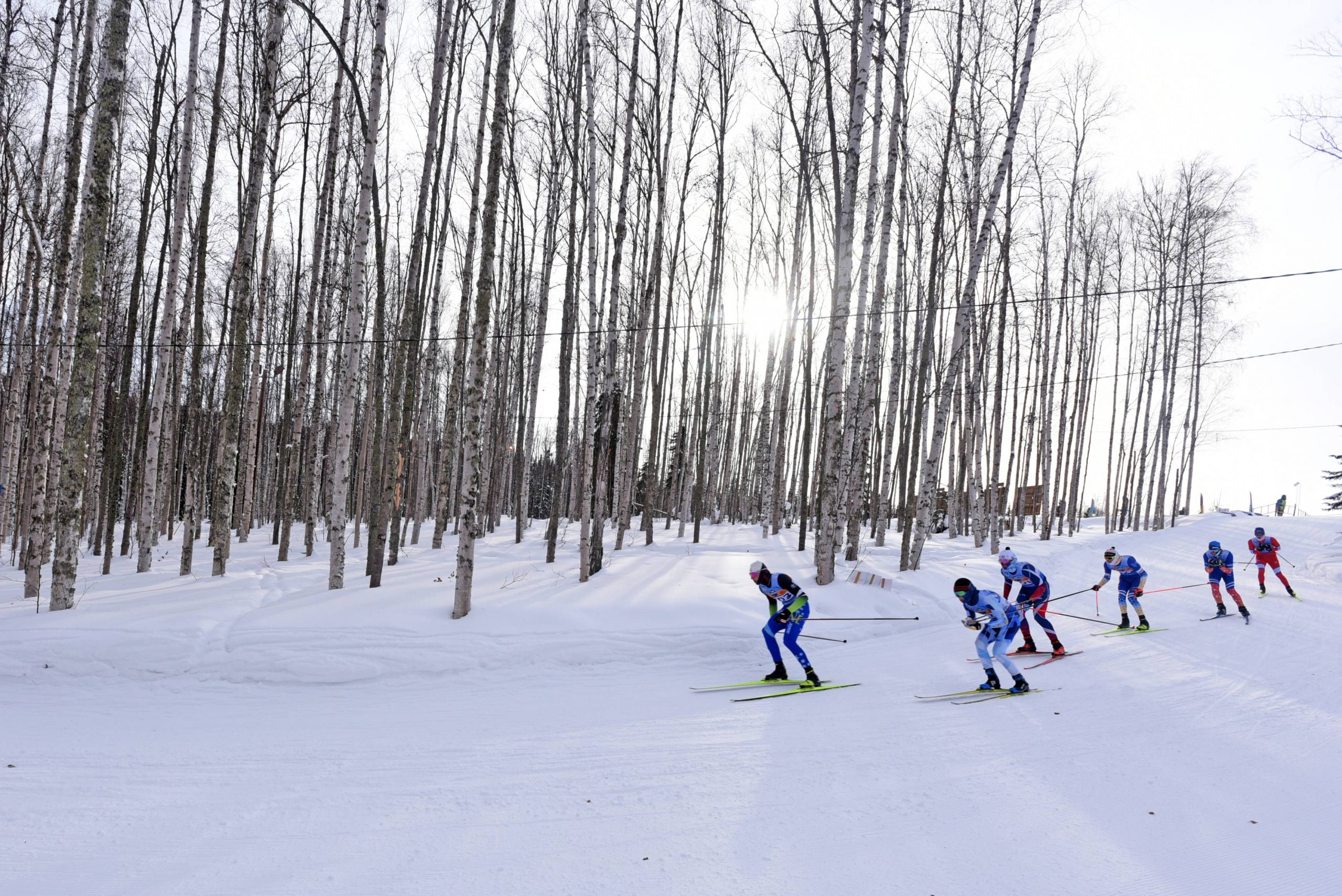
Volunteers dug out the blankets. It was ten below (and falling) at Birch Hill in Fairbanks, Alaska, but the stadium was packed. There were sprint races on, after all: Junior National Championship sprint races. So, the dedicated volunteers cloaked racers in blankets between heats, and the best junior skiers in the nation took on the look of one of those old NFL Films sideline shots where hulking linemen huddle around heaters as steam rises off their bodies and ominous string music plays. Face tape stood in for eye black. The whole scene took on Ice Bowl vibes. Everyone present knew two things: it was brutally cold, and that the cold was making this day forever memorable. With a little imaginative myth making, you could picture Chief of Competition John Estle standing in for legendary Green Bay Packers coach, Vince Lombardi. The decision to run the race could echo Lombardi’s memorable words: “Run it, and let’s get the hell out of here.”
The Nordic Ski Club of Fairbanks (NSF) and Birch Hill have held Junior Nationals five times dating back to 1977. The sentiment among those who remembered 2013, 2003, 1995, or 1977 was that those events had all set new standards for excellence in US skiing, and Fairbanks race organizers have consistently paid attention to the small details, constantly adapting to changes sweeping through the sport. For those in the Fairbanks nordic community, there was a place to direct those compliments: the former University of Alaska-Fairbanks coach who had come to town in the early 1980s and whose leadership had transformed the Golden Heart City into one of the exemplary nordic communities in the country. That’s John Estle, Fairbanks Junior Nationals Chief of Competition.
When skiers first took to the sprint course two days before racing began, Estle could be found manning a tricky downhill, explaining how they had widened the course there by three meters, and that he was trying to place the v-boards just-so to make the heats perfect. Then, when Tuesday rolled around, he was back out among the coaches, asking where they’d come from, warming everyone up with his generous spirit, one that pulled together the Fairbanks skiing community, and then brought the rest of the country in.

Junior Nationals Returns to Fairbanks
Junior Nationals (JNs) brings together the best junior skiers in the country for a week of competition and camaraderie. In Fairbanks, the week saw changes to the JNs program that reflected new directions in the sport, while maintaining the essence of a competition that, through massive changes in cross-country skiing throughout its history, has stuck around as a primary objective, and celebration, of junior skiing in the United States.
The competitive format remained the same, with ten teams representing regional US Ski and Snowboard divisions from across the country; however, the competition format shifted and changed from previous JNs. The most notable shift was a condensed program that eliminated the final Team Relay event and saw racers compete on consecutive days for the first time. A classic 7.5 k opened the week on Monday, with the whole field—U16s, U18s, and U20s, both Boys and Girls—all racing the distance. Tuesday followed with a skate sprint. After a day off on Wednesday, the week closed out with the U16s racing one lap of a five kilometer course, followed by the U18s doing two laps for a 10 k, and the U20s doing three laps for a 15 k.
The new format was further complicated throughout the week by a sweeping blast of arctic cold that altered schedules, inspired wax tech searches for blocks and cans of “polar,” and saw everyone emptying out their suitcases in search of extra layers. Factors complicating the task of ski racing piled on; yet, the junior skiers braved the cold, kept their focus, and put together a week of outstanding performances that demonstrated the breadth and bright future of American skiing.
Classic 7.5 k Interval Start—Monday
The legendary Alaskan cold arrived on the morning of the first race, and remained through the rest of the week: bone-chilling cold mixed with frenetic energy of anticipation and nerves gathered from around the nation. Face tape, buffs, and sunglasses hid any signs on the racers, but there was plenty to be excited about in the racing that followed.
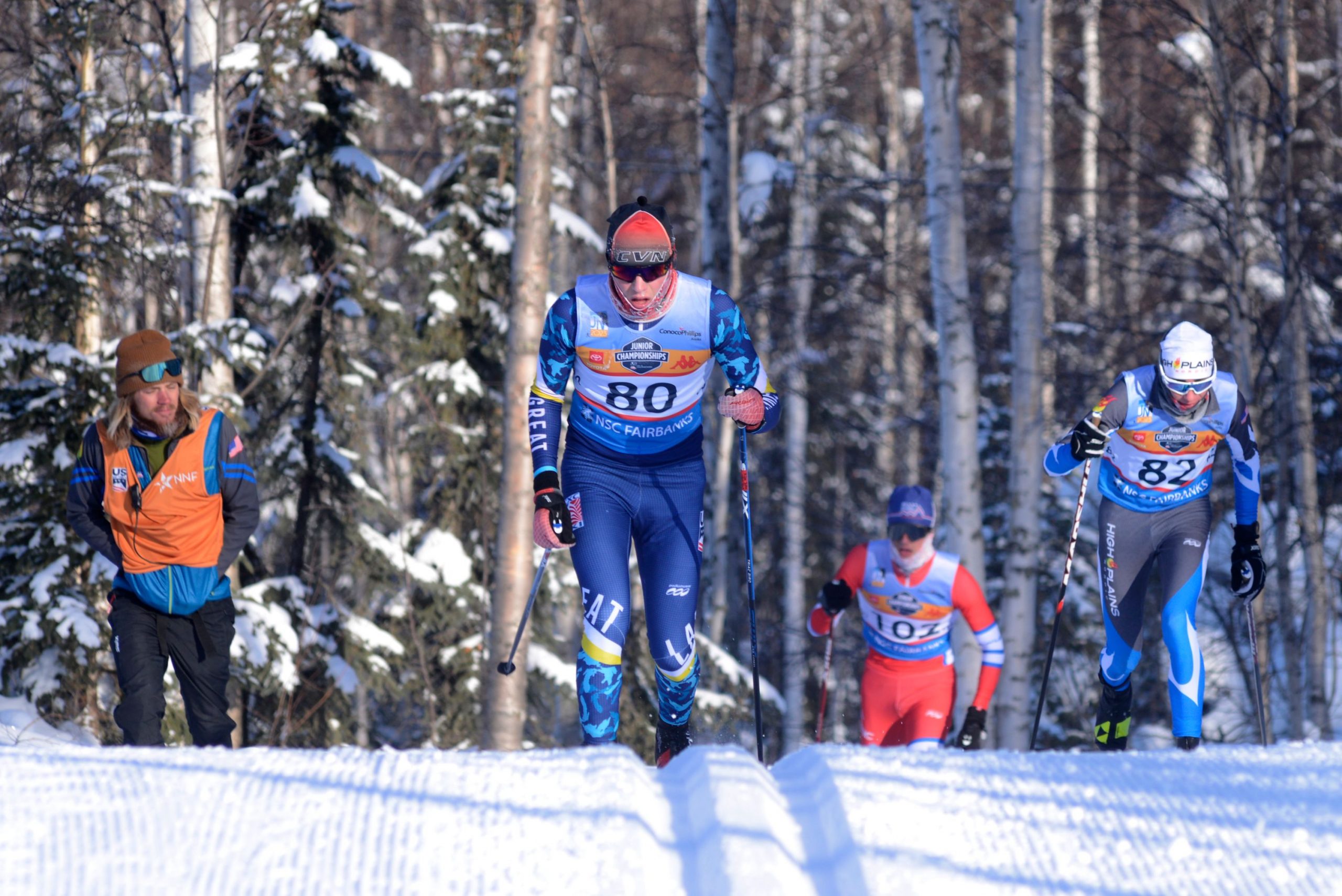
The 7.5 k course dreamt up for the event featured long, stride-friendly uphills, and what course designer John Estle characterized as “active downhills,” the kind that wind, bump, groove, and—for the dynamic skier—offer seconds to be taken. The Boys field—including racers from U16, U18, and U20 racers—was first to hit the course. Reverse-seeding meant that observers looked towards the back of the field in each age class to take the top results, but right away with the U16 Boys, racers set out to remind everyone that races don’t happen on seed lists, they happen out in the cold and the snow. Chief among these racers was Midwest skier, Logan Drevlow (Loppet Nordic Racing), who started bib 27 in a field of 68. Drevlow’s early splits were way ahead of the field on course; as the bibs kept coming, the only question would be whether the starters in the back of the field would best his 23:26.1 finishing time.
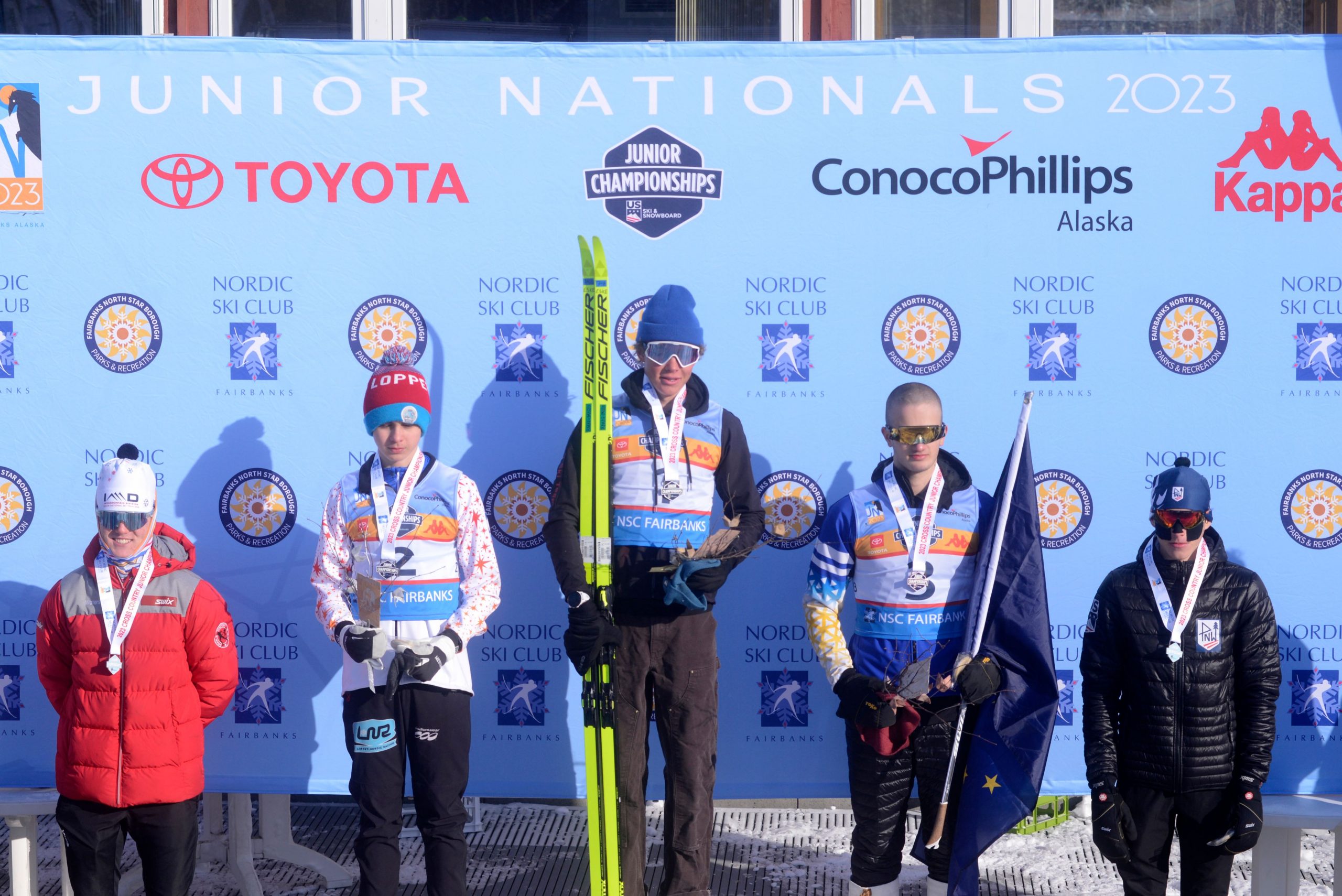
At three kilometers, the only skier bettering Drevlow’s split was Rocky Mountain’s Will Bentley. The top seeded skier in the field, Bentley came through two seconds up on Drevlow. At the 5 k split, they were dead even, 14:55.2 apiece. What happened in the split seconds after Bentley received that split would become the Ski and Snowboard Club Vail (SSCV) skiers’ signature through the rest of the week. Around a horseshoe bend that went into a downhill section, he turned the gear up, worked the downhill and never looked back. Bentley crossed the finish-line in 23:13.0, having taken 10 seconds over Drevlow in the last 2.5 k. He had the first national title of the week, the first national title of his career, and a powerful finishing kick.
Logan Drevlow’s time withstood the rest of the field, and the Midwest skier from Minnetonka, Minnesota landed in second place. Fairbanks native, Wells Wappett (Nordic Ski Club of Fairbanks), rounded out the podium to begin the week on an auspicious note for himself, and his home club.
The pitched battle among U16 Boys set the tone for the day, and the U20 Girls capped it off in a manner that managed to excite the fans and warm even those coaches assigned to split duty (i.e., this writer). Sofia Scirica’s (Eastern Mass XC) early splits topped the field, though her early efforts were matched and topped by mid-race charges by Midwest skier, Greta Hansen (Minneapolis Ski Club). As it played out, Hansen took more time on Scirica through the first part of the last 2.5 k, having a four second advantage going into the last set of climbs that wound into the stadium. Scirica though, would produce a final kick that wouldn’t be matched, striding over the two major climbing sections to take the last split by six seconds, and net her two seconds over Hansen, who finished second place. Evie Walton (New England) closed from seventh place at the 5 k checkpoint to claim the third podium spot.

The rest of Monday’s races served as an introduction to the nature of each competing field, while also serving as a space for impressive performances. The fastest girls time from any field on the day came from the U16 field, where Intermountain’s Lena Poduska set a time of 26:06.6. The Jackson Hole skier claimed her first national title 52.2 seconds ahead of second place Ally Wheeler (High Plains/Casper). In third place, Annelies Hanna (Ford Sayre) added another podium finish for New England.
The fastest Boys time on the day, meanwhile, came from Rocky Mountain skier Trey Jones. Jones started the U20 Boys race with a small time gap and grew and grew it throughout the race. Jones would eventually cover the 7.5 k course in 22:16.5, The Steamboat Springs skier’s dominant performance foreshadowed a week of impressive results, and a hard-earned national title after finishing runner-up in a close fought U18 Classic Sprint in Minneapolis last year. Jones was followed by the Intermountain pair of Max Kluck (Bridger Ski Foundation) in second and Wes Campbell (Park City/Michigan Tech) in third.
Two pre-race favorites loomed over the U18 Boys field, with the New England pairing of Tabor Greenberg (Green Mountain Valley School) and Fin Bailey (Stratton Mountain School) fresh off of a set of historic results for Team USA at the U18 Nordic Nations’ Cup. The two traded splits during the race: Bailey possessed the early edge, while Greenberg delivered a final 2.5 k that couldn’t be matched. Greenberg in first and Bailey in second were joined by early-goer Tommy Simmonds (LNR), whose early splits withstood the field and netted a third place for Midwest.
Finally, the U18 girls field featured a top four that all finished within 30 seconds of each other, a tightly packed and talented group that would battle throughout the week. Rocky Mountain’s Rose Horning (Ski and Snowboard Club Vail/Leadville) was the early pace-setter, before Pacific Northwest’s Neve Gerard (Mt. Bachelor) kept a consistent gap of about 15 seconds over Horning’s time. Then, Intermountain’s Maeve Ingelfinger put in a late push to slot between Gerard and Horning at the finish, before the last bib to start, Sydney Drevlow (LNR), wound through to top the field. Drevlow claimed her first U18 National title, after winning two U16 titles last JNs, with Gerard in second, Ingelfinger in third, and Horning fourth.
Skate Sprint—Tuesday
The arctic cold arrived Monday; by Tuesday was when it started to seep into race plans. The organizers’ solution was a quintessentially Alaskan one; move the racing back later in the day, knowing there would be plenty of springtime evening daylight to spare. Under the revised schedule that started races at noon, the final heat of the day went out at 6:20pm.
Birch Hill’s 1.5 k sprint climbs a gentle, sweeping ramp that curls into a gradual downhill through the stadium, before dropping into a twisting downhill, long uphill, and chicane leading to the finish line. There were places to make moves for both the able tactician, and for the sprinter confident in their all-out, head-to-head speed. In some heats, both the all-out and the tactical were in play simultaneously.
The U16 Boys Final saw a top qualifier, Wappett, line up with Monday’s Champion, Bentley, Quinten Koch (Pacific Nothwest/Plain Valley), Callahan Waters (Intermountain/BSF), Silas D’ Atre (Pacific Nothwest/Plain Valley), and Campbell McLaren (Rocky Mountain/Steamboat Springs). From the gun, Quinten Koch set the heat into high gear, with his Plain Valley teammate D’Atre following alongside Wappett. When the field hit the dip that wound into the downhill, Koch and Wappett were able to create a slight separation that held as they wound into the final climb. Bentley was back in the pack, sitting fourth, but—as he had done on Monday—looking to close the course out with a well-timed burst of speed. He shot around the outside to move up the pack. Koch hit the flat chicane that led to the final sprint first and used his inside line to shoot to a national title. Wappett, who had been at the front of the race for the duration, and Bentley who had moved late, sprinted, joined by Callahan Waters who had come up late too. Wappett was able to take the advantage around the corner to claim second, as Bentley and Waters sprinted for third. Bentley won a boot toss by 0.03 seconds. It was a first national title for Koch, on a day where his home club had put two in the U16 Boys final.

The mix of racing styles found in the U16 Boys was repeated throughout the day, also producing a close finish in the U16 Girls final. In a grinding final hill battle, Alaska’s Olivia Soderstrom (Alaska Winter Stars) and Intermountain’s Taylor Nalder (McCall Nordic) dueled to the line where a lunge brought Soderstrom a national championship by just 0.3 seconds. Nalder finished runner-up, and Lena Poduska added a second skier on the podium for Intermountain, winning another close podium battle over New England’s Amelia Circosta (Craftsbury).
Alaska’s Derek Richardson (APU) had the most commanding win on the day, after a minor tangle in the U20 Boys final and a final punch on the last climb left the Washington State native out in front to take a national championship by four seconds. A close battle for the podium followed, with Rocky Mountain’s Trey Jones taking second place, as Matthew Seline (Far West/Sugar Bowl) won a boot throw over Miguel Fresco Hanlon (Intermountain/Sun Valley) for third place.
New England’s Fin Bailey took a tactical approach in the U18 Boys field, waiting until the last section of the final climb to gain an advantage that would net him his second U18 sprint national championship in as many tries. Bailey netted three seconds over second place Murphy Kimball (Alaska/Alaska Winter Stars) and his New England teammate Tabor Greenberg in third.
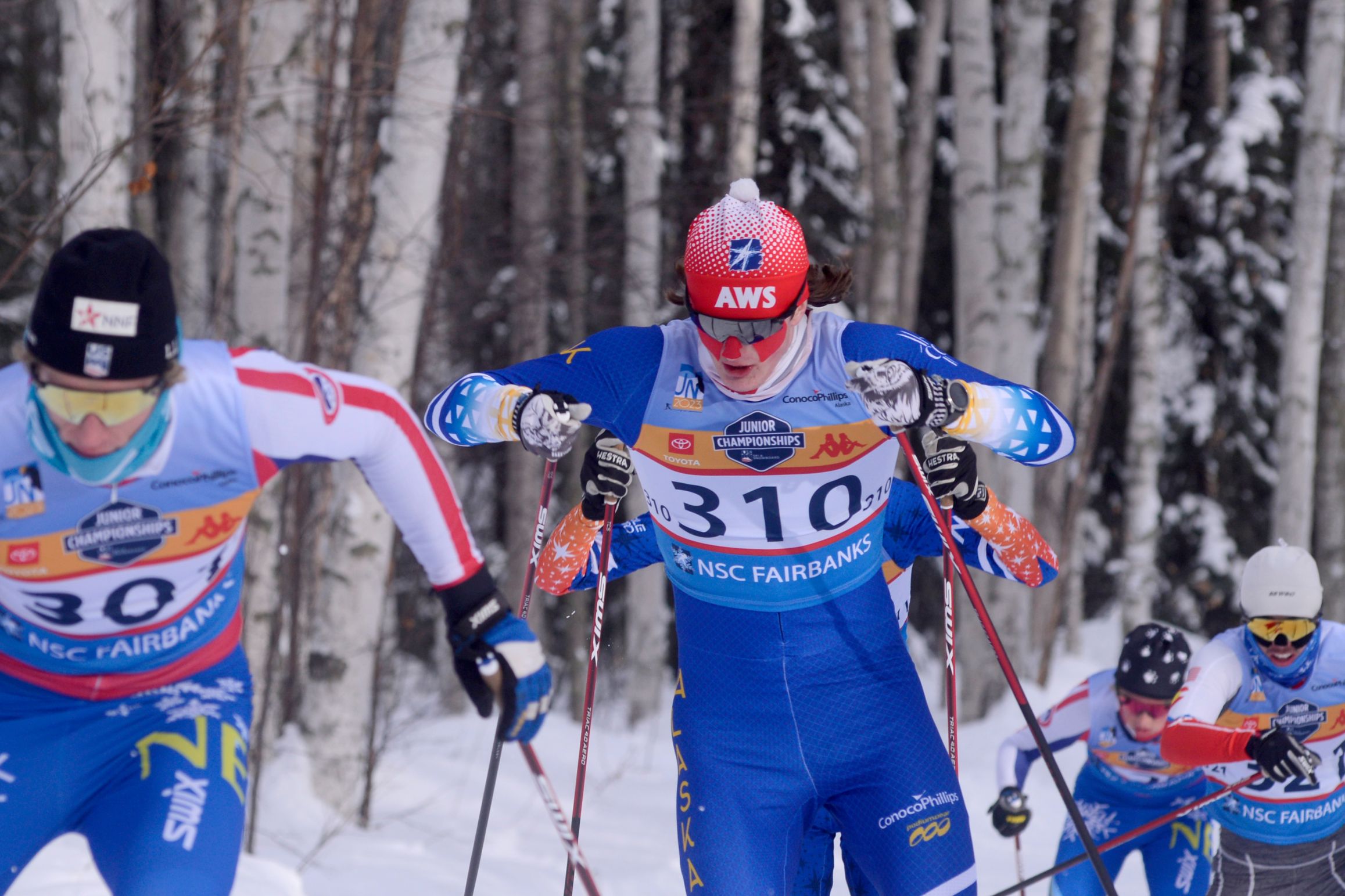
The U18 Girls field saw the tight-packed individual racing on Monday experience a podium shuffle, with Maeve Ingelfinger taking the win for Intermountain just ahead of Pacific Northwest’s Neve Gerard. Monday’s champion, Sydney Drevlow, finished third for Midwest.
The U20 Girls saw a similar type of shifting battle, with Katey Houser (Montana State) claiming a national championship for Alaska in a tense final sprint ahead of the New England pair of Scirica and Walton, both of whom earned their second podiums of the week.
Mass Start Skate 5 k/10 k/15 k—Thursday
An inversion descended on Birch Hill on Thursday morning as temperatures climbed to balmy single (positive) digits, though the cold still forced a delay and a constriction on the schedule. A day of Mass Start racing originally slated to take place over four or five hours was now slated to take place over two or three, adding a kind of fast and furious undercurrent to the racing. U16s would race one lap of a 5 k course, followed by the U18s doing two laps for 10 k, and the U20s doing three laps for 15 k.
A modification of Monday’s course eliminated the long, winding, downhill that characterized that course’s first kilometer, replacing it with a straight-shot, super-highway wide, all uphill first kilometer. Raced over one lap, the first kilometer represented a hill to jockey and move before the race rolled into the last set of climbs. Raced over two or three laps in combination with the course’s last kilometer of all uphill, though, it represented a super-sustained climbing section that made the Birch Hill course one for those who liked to V1, and liked to do it a lot.
Perhaps the best fit for that descriptor was Rose Horning. In the U18 Girls race, the Leadville, Colorado native and SSCV skier went off the front of the pack as soon as the terrain pitched up. Every successive climb only made her gap to the rest of the field more distinct. Her climb from the bottom of the stadium to the top of the course from 5 k to 6.5 k left her all alone. Horning stayed that way, crossing the finish-line, arms aloft, to claim her U18 national championship. The pack that followed had raced the 10 k hard from the start as a result, and in another performance where she pushed all the way through, Neve Gerard scored runner-up for Pacific Northwest, with Sydney Drevlow finishing her week out with a third place, and third individual podium, for Midwest.
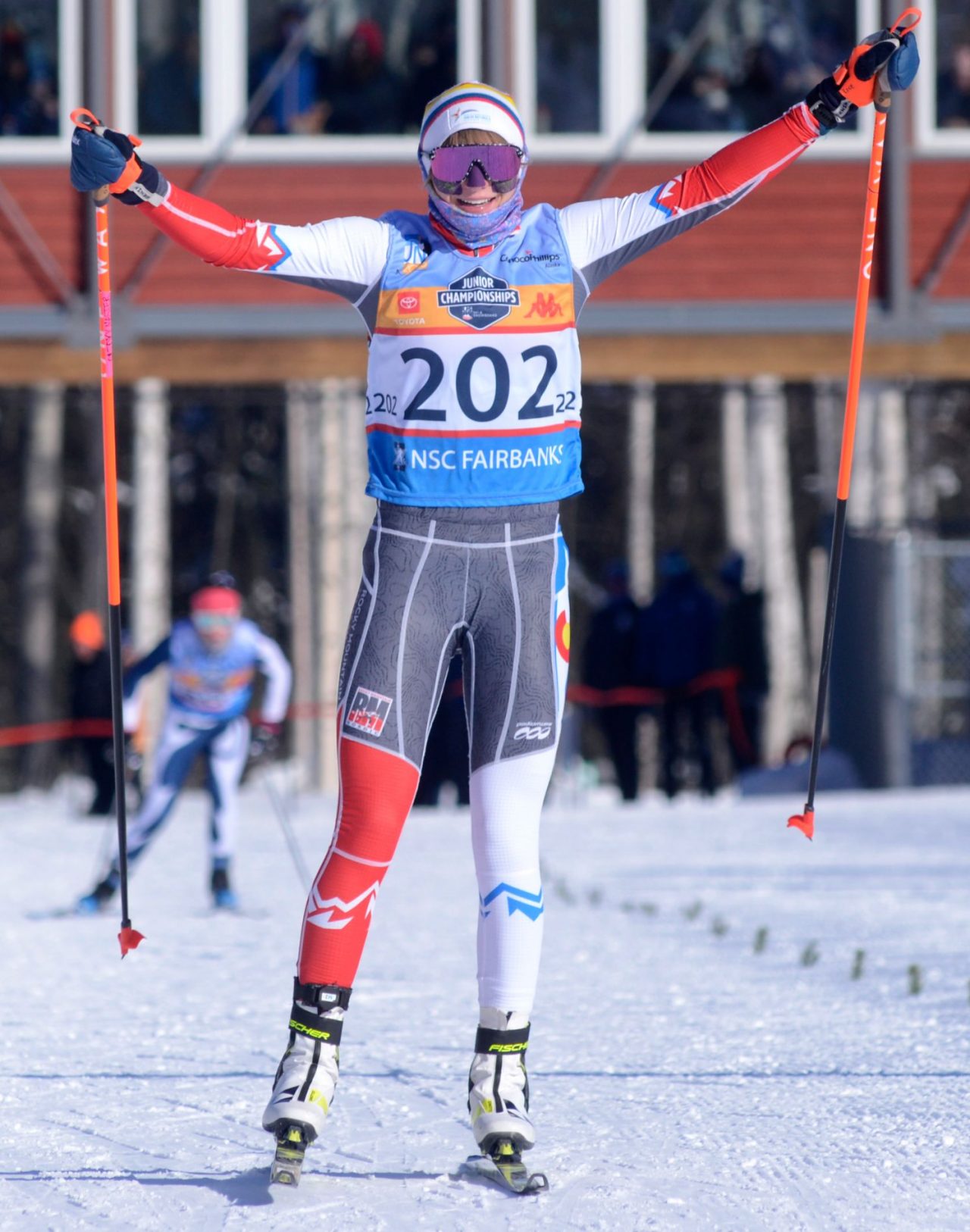
Horning’s strategy to push hard and push early found its contrast in the race that preceded it, when the U18 Boys raced the first lap in tactical stalemate. A lead pack of nearly twenty skiers came through the halfway point largely together, with the front controlled by New England suits: Tabor Greenberg, Finn Bailey, and Luke Rizio. The pack started to stretch on the ascent of the kilometer long climb that began the second lap. As it neared the summit, Benjamin Barbier (Steamboat Springs) started to move up through the pack. He went over in the top ten, and made a split in the field that would start to snap into two distinct groups. The first—led by Greenberg and Rizio—wound towards the final kilometer climb where Greenberg, Barbier, Rizio and Intermountain’s Lucas Wilmot (Jackson Hole) started to move to the front. In the final run-in that followed, Greenberg edged out Barbier by 1.9 seconds, claiming his second National Championship of the week. Lucas Wilmot claimed third place, with Rizio fourth.
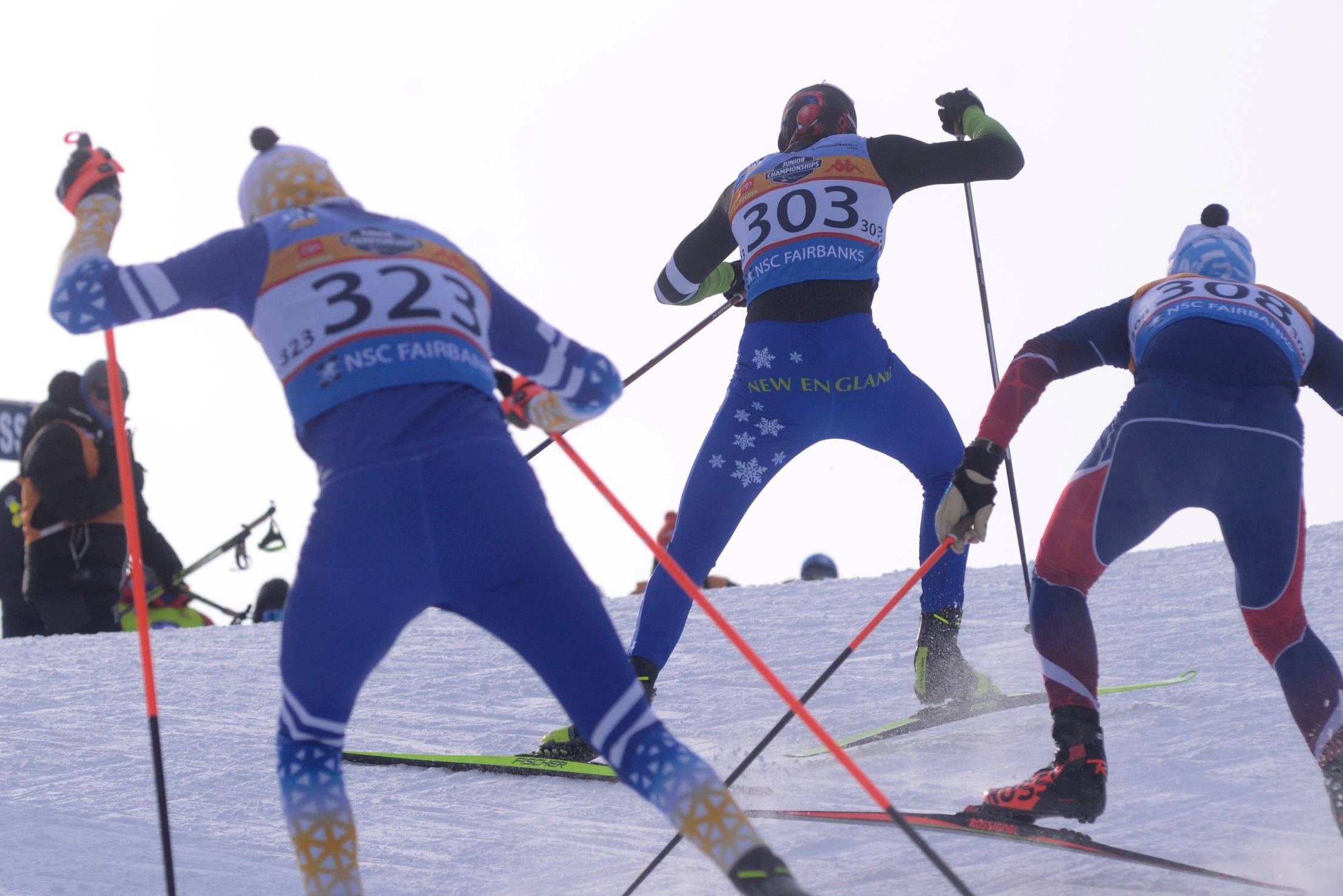
Greenberg was joined in the distinction as a two-time champion on the week by Intermountain’s Lena Poduska in the U16 Girls race, who again dominated the distance field. Poduska finished with a 31 second gap over second place Anneleis Hanna, who was joined on the podium by New England teammate Mary Harrington (Green Mountain Valley School) in third. Trey Jones also won a second national championship on the U20 boys field, making a move alongside Rocky Mountain teammate Luka Riley (University of Colorado) to finish out in front of the 15 k field. University of Alaska-Fairbanks’ Philipp Moosmayer rounded out the podium in third.
Fairbanks home fans had more to celebrate in the U16 Boys field, as Fairbanks Nordic skier Wells Wappett capped his outstanding week by finishing on the top step of the podium. Wappett had been in the lead pack all day, but was challenged when the Rocky Mountain pairing of Will Bentley and Campbell McLaren pushed late in the race. Bentley ultimately fell just short to the Alaskan in second, as McLaren held off all other comers for third.
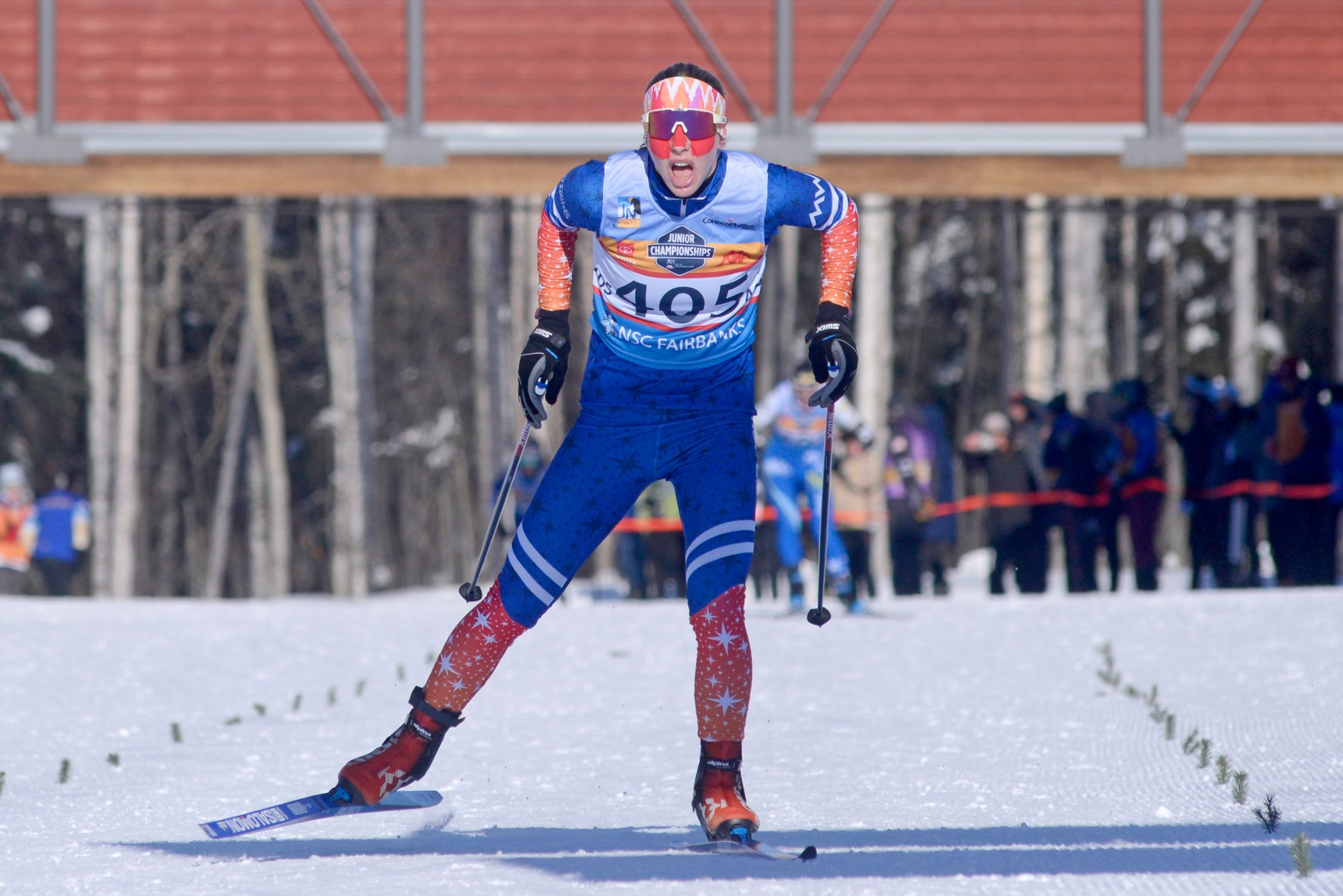
The final race of the week featured the U20 Girls competing in a 15 k. In a move on the second ascent of the big climb, Midwest’s Greta Hansen (Minneapolis Ski Club) skied off the front and held all the way through to the finish line. After her runner-up performance in the Classic race on Monday, Hansen had capped off her week with a national championship. The pack that followed her remained in contact until the last climb of the big hill, and then strung out as New England’s Cat Stow (Michigan Tech) finished strong in second place, and Katey Houser (Montana State) rounded out the podium for Alaska in third.
Dave Quinn Award and Team Titles
After the racing had concluded, the JNs caravan made its way to the University of Alaska-Fairbanks Arts Center to celebrate the team racing that shone a light through the whole week and reflect on the point in the journey that JNs marked for the junior skiers participating. Imparting that message was keynote speech from Fairbanks native and 2018 Olympian, Reese Hanneman, who traced a line from his first Junior Nationals experience in 2005 to PyeongChang, and imparted the two defining characteristics that propelled his journey: “gratitude and grit.”
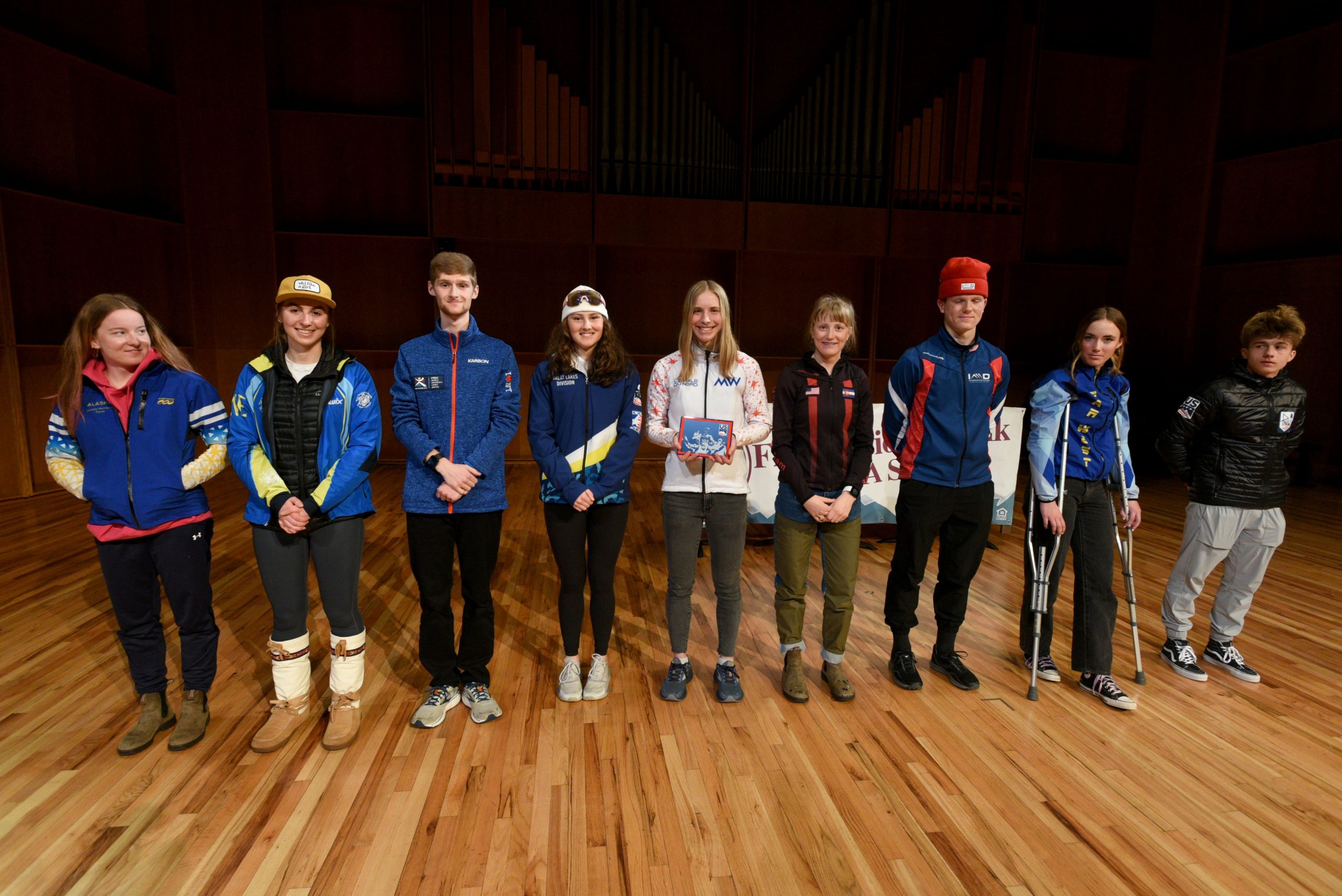
In the spirit of celebrating the types of values that Hanneman highlighted, the only individual award given at the final Junior Nationals award ceremony is the Dave Quinn award, named in honor of the Colorado skier who had been a Junior Nationals champion, Birkie winner, and US Ski Team member before prematurely passing away from cancer. This year’s winner was Midwest skier Greta Hansen, who overcame a rare heart condition on her way to becoming a national champion in the 15 k U20 Girls race held just hours before she was called to the stage at UAF. Read about Hansen’s incredible journey, in her own words, here.
The Team Awards program recognized efforts across three different classifications. The one being tracked closely throughout the week was the Alaska Cup, which is awarded to the most successful Divisional team at JNs. The Roger Weston award for best high school team and best club team from the week were also recognized as classifications.
In a battle that had remained pitched all week, New England held onto the Alaska Cup for the eighth Junior Nationals in a row, dating back to 2014.* This, however, marked one of the closer Team contests of the New England-dominated era, with Intermountain stringing together sprint and mass start days that left them just 37 points behind in second place. It marked a step up the podium for Intermountain, after finishing third last year. Midwest took third place with Alaska and Rocky Mountain fourth and fifth, respectively.
Top club honors remained with Minneapolis’ Loppet Nordic Racing for another year, with the top Boys club honors going to Steamboat Springs Winter Sports club, and the Girls title going to Boston-based Eastern Mass Cross Country Ski Club. The Roger Weston trophy for the best high school team went to West Anchorage High School, which also won the Boys trophy. The Girls trophy went to Truckee High School.

Lake Placid, 2024
The sun went down in Fairbanks just as the awards banquet was coming to a conclusion. When the event may return to Fairbanks is as yet undetermined. For now, junior skiers are already shifting their dreams to replace Alaskan Birch trees with Adirondack Spruce, as Junior Nationals heads to Lake Placid in 2024.
When JNs returns one day to Fairbanks, there will be certainties: the community that pulled together to put on an excellent week in 2023 will do so again. The courses will be meticulously maintained, the people hospitable, the northern lights still causing some racers to stay up a little too late the night before their races. The only uncertainties are hopeful ones. Where will the junior skiers that pushed and inspired at Birch Hill in 2023 take US skiing in the future? All indications are bright.
Full Junior Nationals RESULTS
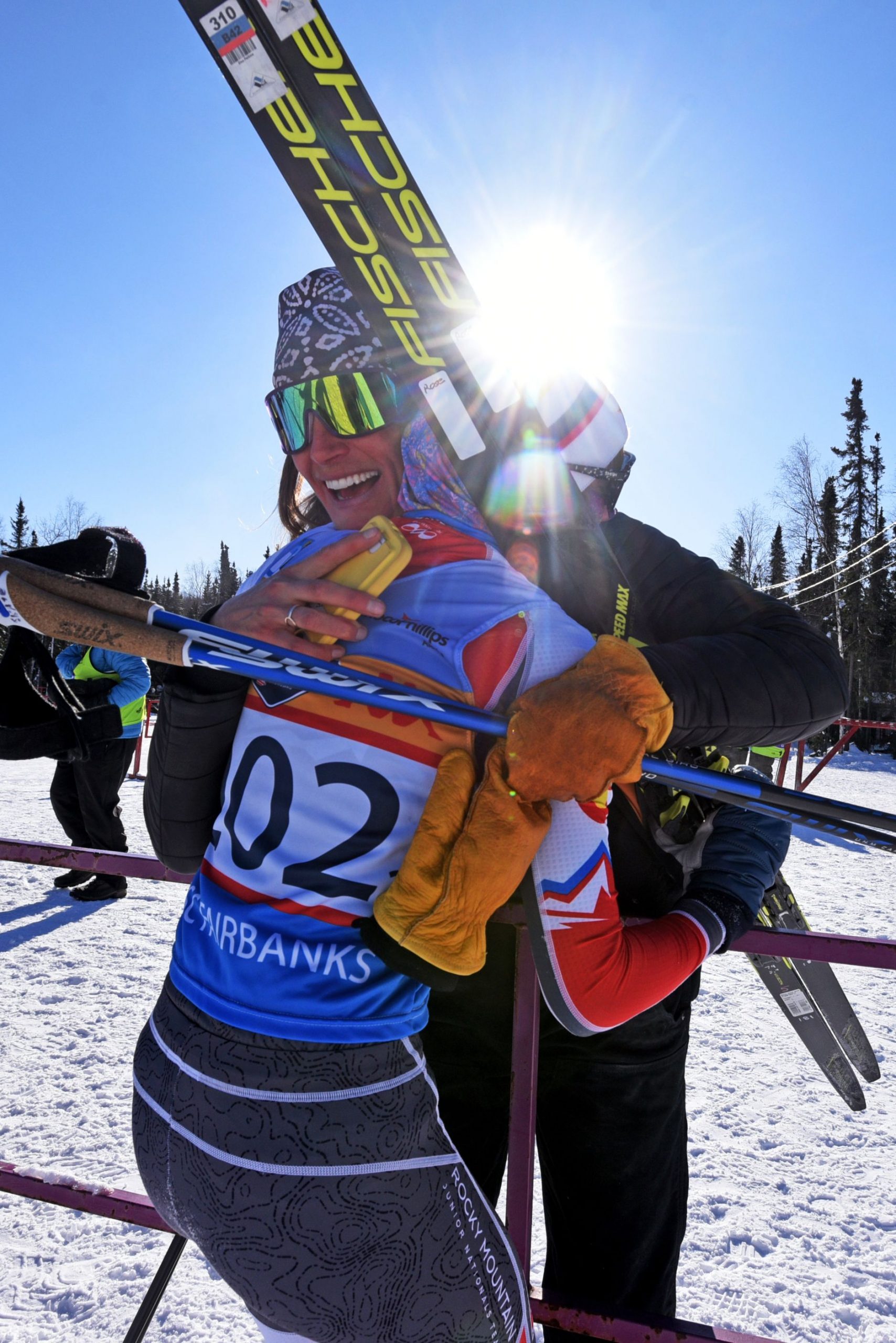
More photos from 2023 Junior Nationals in Fairbanks, Alaska are available from Event Photographer Eric Engman HERE.
Ben Theyerl
Ben Theyerl was born into a family now three-generations into nordic ski racing in the US. He grew up skiing for Chippewa Valley Nordic in his native Eau Claire, Wisconsin, before spending four years racing for Colby College in Maine. He currently mixes writing and skiing while based out of Crested Butte, CO, where he coaches the best group of high schoolers one could hope to find.

